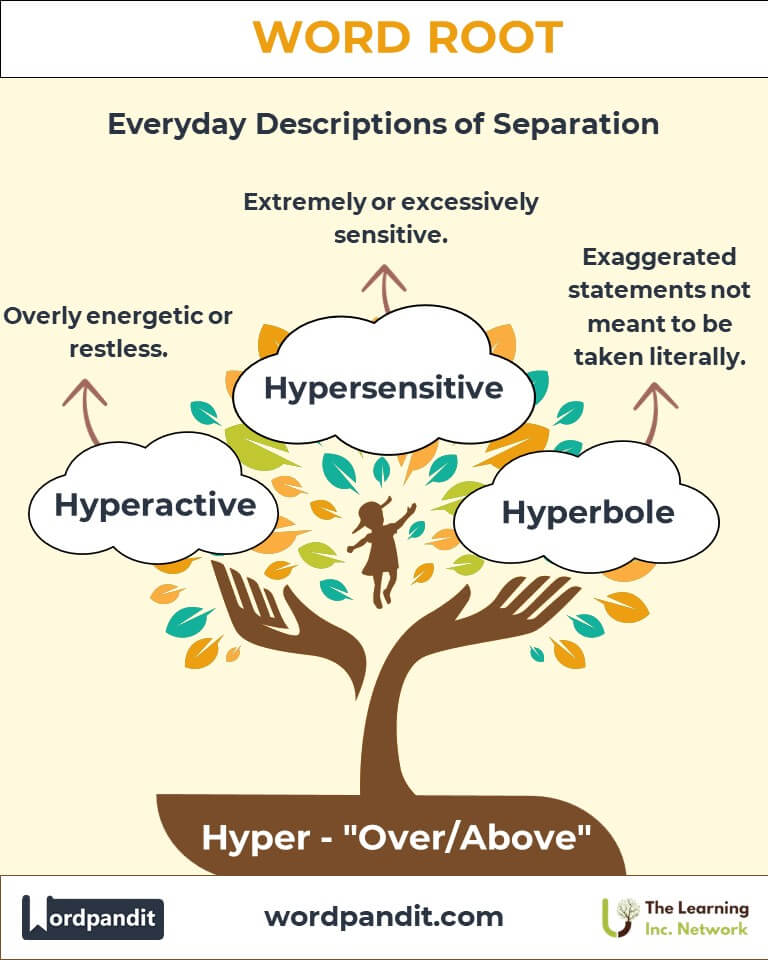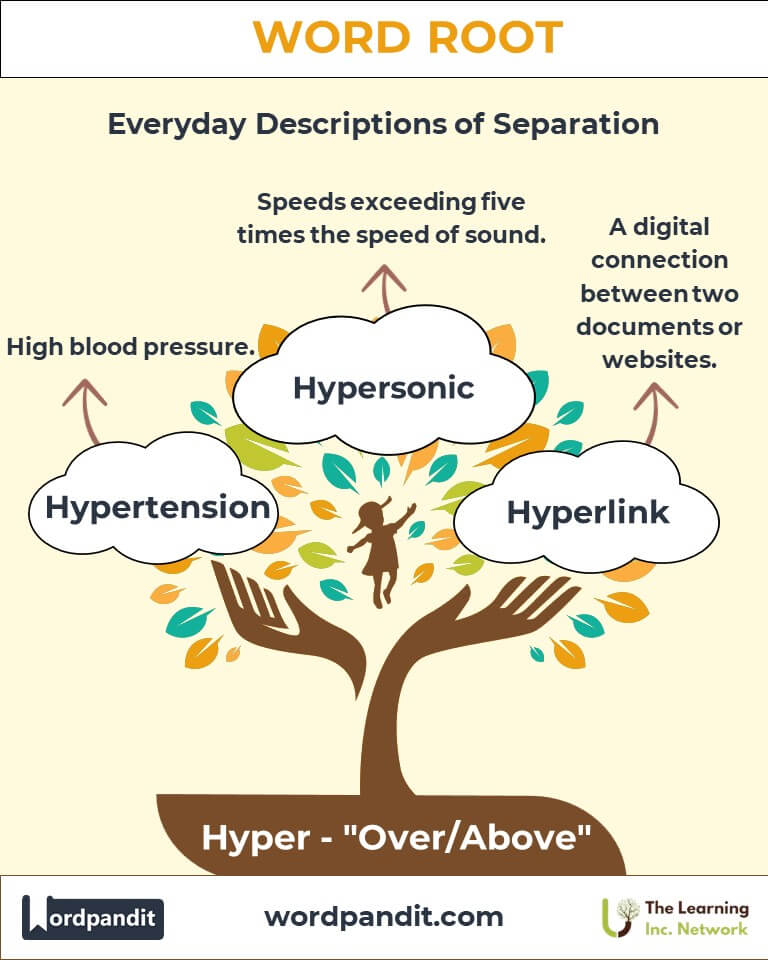Hyper: The Root of Overachievement and Exuberance in Language
Dive into the dynamic world of "Hyper," a word root originating from Greek, meaning "over" or "above." From describing heightened states like being "hyperactive" to the hypersensitive nuances of modern science, this root drives the vocabulary of intensity, excess, and beyond-the-norm experiences.
Table of Contents
- Introduction: The Energy of "Hyper"
- Etymology and Historical Journey
- Mnemonic: Unlocking the Power of "Hyper"
- Common "Hyper"-Related Terms
- "Hyper" Through Time
- "Hyper" in Specialized Fields
- Illustrative Story: "Hyper" in Action
- Cultural Significance of the "Hyper" Root
- The "Hyper" Family Tree
- FAQs About the agr Word Root
- Test Your Knowledge: agr Word Root Quiz
- Conclusion: The Thriving Legacy of "Hyper"
Introduction: The Energy of "Hyper"
What do we call a child who can't sit still or a situation that’s blown out of proportion? The answer often involves "Hyper," a root brimming with energy and intensity. Pronounced "hi-per," it comes from Greek origins, meaning "over" or "above." Today, "Hyper" enriches words that evoke heightened states of activity, sensitivity, or even technology, making it an indispensable part of our lexicon.

Etymology and Historical Journey
The root "Hyper" traces its lineage to the ancient Greek word "huper," which means "over" or "beyond." From classical literature to early scientific texts, "Hyper" carried connotations of extremity and surplus. It seamlessly transitioned into Latin and, subsequently, into English, shaping terms that highlight intensity or excess in various domains, from emotions to physiology.
Mnemonic: Unlocking the Power of "Hyper"
Imagine a superhero leaping over skyscrapers with boundless energy and a flashing emblem that reads "HYPER" on their chest. This image encapsulates the essence of "Hyper"—always above, beyond, and bursting with intensity.
Mnemonic Device: "Hyper is the hero of excess, always over the top!"
Common "Hyper"-Related Terms
- Hyperactive (hy-per-ak-tiv): Overly energetic or restless.
Example: "The hyperactive puppy ran circles around the room for hours."
- Hypersensitive (hy-per-sen-si-tiv): Extremely or excessively sensitive.
Example: "Her hypersensitive skin reacted to the slightest touch of wool."
- Hyperbole (hy-per-bo-lee): Exaggerated statements not meant to be taken literally.
Example: "The comedian’s hyperbole had the audience roaring with laughter."
- Hypertension (hy-per-ten-shun): High blood pressure.
Example: "Managing stress is crucial to avoiding hypertension."
- Hyperlink (hy-per-link): A digital connection between two documents or websites.
Example: "Click the hyperlink to access additional resources."
- Hypermarket (hy-per-mar-ket): A large retail store combining a supermarket and department store.
Example: "The hypermarket offers everything from groceries to electronics."
"Hyper" Through Time
- Hyperion (Greek Mythology): A Titan associated with the sun, symbolizing heights and brilliance.
- Hyperbole (Rhetoric): Used since ancient times to emphasize exaggeration in speech and writing.
- Hypertext (Modern): Coined in the mid-20th century, it revolutionized how we navigate digital information.
"Hyper" in Specialized Fields
- Medicine:
Hyperglycemia: Elevated blood sugar levels, crucial in diagnosing diabetes.
- Physics:
Hypersonic: Refers to speeds exceeding five times the speed of sound.
- Technology:
Hyperthreading: A computer processing technology for faster performance.
- Business:
Hypergrowth: Refers to rapid expansion in a company’s revenue or scale.
Illustrative Story: "Hyper" in Action
In a bustling city, Mia, a hypersensitive artist, noticed every detail others missed—the rustle of leaves, the distant hum of machinery. Inspired, she created hyperrealistic paintings that stunned audiences. Her work gained global fame, proving that being "hyper" wasn’t a flaw but a gift for seeing the extraordinary in the mundane.
Cultural Significance of the "Hyper" Root
The root "Hyper" reflects society’s fascination with extremes—be it hyperactive children, hypersensitive sensors, or hyperconnected networks. It embodies the human desire to transcend limits, pushing boundaries in art, science, and technology.

The "Hyper" Family Tree
- Super (Latin): "Above" or "beyond."
- Superhuman: Exceeding ordinary human abilities.
- Ultra (Latin): "Beyond" or "extreme."
- Ultrasound: High-frequency sound waves used in imaging.
- Over (Old English): Suggesting excess or above.
- Overachieve: To perform better than expected.

FAQs About the "Hyper" Word Root
Q: What does "Hyper" mean?
A: "Hyper" comes from Greek, meaning "over" or "above." It often implies something excessive, heightened, or beyond normal limits, whether referring to physical activity, sensitivity, or technological advances.
Q: Is "Hyper" always negative?
A: Not at all! While "Hyper" can describe negative extremes like hypertension (high blood pressure), it also applies to positive qualities such as hyperintelligence (exceptional intelligence) or hyperrealism (artistic precision that transcends reality).
Q: What is a Hyperlink?
A: A hyperlink is a digital connection between web pages or documents, allowing users to "jump" from one location to another. The prefix "Hyper" in this context reflects its role in creating dynamic, interconnected networks that transcend linear structures.
Q: How is "Hyper" used in medical terminology?
A: "Hyper" is commonly used in medicine to describe conditions involving excess. For instance:
- Hypertension: High blood pressure, often linked to stress or lifestyle factors.
- Hyperglycemia: Elevated blood sugar levels, a critical indicator in diabetes management.
Q: What’s the difference between "Hyper" and "Super"?
A: Both mean "above," but "Hyper" emphasizes intensity, excess, or extremity, while "Super" often connotes superiority, exceptional quality, or being above others. For example:
- Hyperactive: Excessively energetic.
- Superhuman: Having abilities beyond human capabilities.
Q: What is the significance of "Hyper" in technology?
A: In technology, "Hyper" denotes advanced or interconnected systems, like:
- Hypertext: A foundational concept of the internet, allowing non-linear navigation.
- Hyperthreading: A computing technique to boost performance by running multiple processes simultaneously.
Q: Why is "Hyperbole" not literal?
A: "Hyperbole" (exaggeration for effect) stems from "Hyper," signifying something "beyond" the truth. It’s a rhetorical device meant to emphasize or dramatize rather than convey factual accuracy.
Test Your Knowledge: Hyper Word Root Quiz
1. What does "Hyper" mean?
2. Which term means overly energetic?
3. What does "Hyperbole" mean?
4. What is "Hypertension"?
5. What field uses "Hypersonic"?
Conclusion: The Thriving Legacy of "Hyper"
The root "Hyper" captures the human tendency to amplify, intensify, and push boundaries. From health and technology to language and art, its presence underscores our relentless drive for more—more energy, more connection, and more meaning. Let "Hyper" inspire you to embrace life with unbridled enthusiasm, always striving for what’s beyond the ordinary.













Why is hyper-fit hyphenated but none of the other examples are? How do you know when to hyphenate hyper? I am trying to use the term hyper-personalization in a marketing context. Would it be hyperpersonalization? hyper personalization?
Indeed a hyperefficient way to learn new words.
Thanks alot Mahi..:)
This is fantastic and unbelievable way of learning meanings of a large number of previously unknown words within no time. The only thing one has to learn here is meaning of the roots which prefix with other words to make new words.